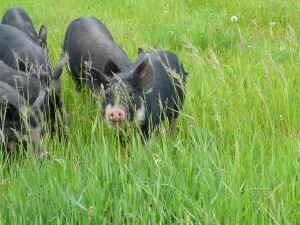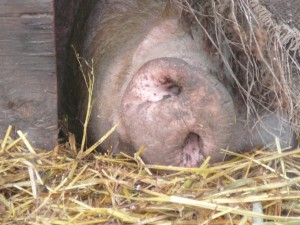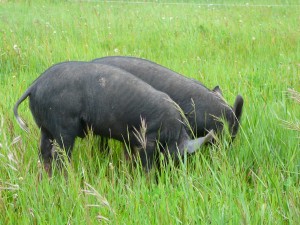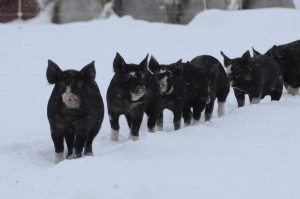We presently specialize in sharing our organic pork with customers in Vancouver but there is a long history that brought us to where we are now.
First Time Raising Pigs
It was around 1978 and I was living in a tiny log house in a forest near Goodfare. My cousin asked if I could look after a couple of pigs while he took a month off traveling. “Sure!” was my inexperienced response. It would be my first encounter with live pigs. There was an old log barn and if I nailed some planks over the open door, I could keep them there! My cousin brought the two pigs over and they settled in quite nicely into their new home.
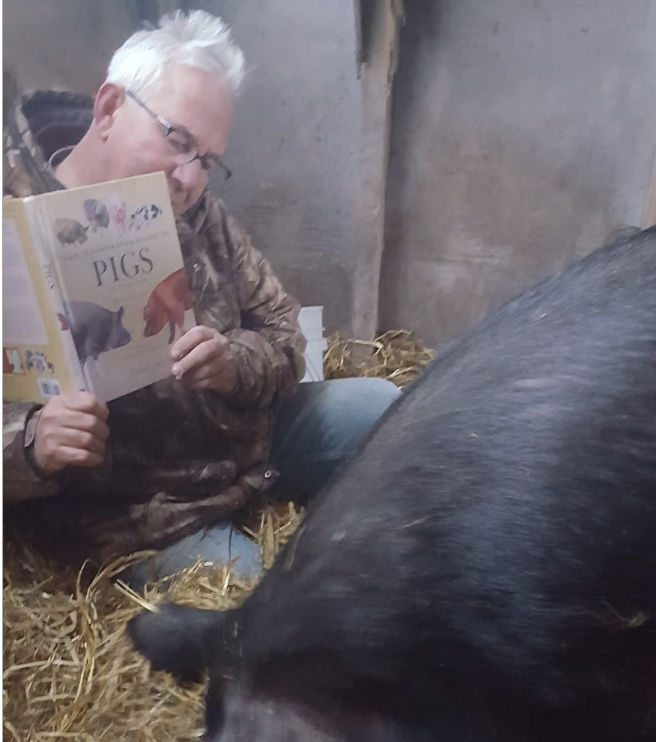
Every morning I brought their food and water and was quite enjoying their company. One day, returning from a town trip, I grabbed my guitar before I went to check the pigs. I started wandering down the path, strumming a “G chord” but as I got closer I could hear there was something wrong. The pigs were very distressed, racing in circles. I stopped my strumming but it was too late. They burst through the planks I’d nailed across the door, and bolted, headed straight through the forest. It was days before they returned. I gave up playing guitar for a while.
Why Berkshire ?
Years later when I became a little more serious about raising pigs I started out with pink pigs. They were a cross of several modern breeds and although they had a good life on the farm, I was often disappointed with their mothering skills. They had been bred for pork production and not for instincts. All of our pigs give birth outside so the ability to prepare for birthing and then take care of the piglets are important skills to have. Then I discovered Berkshires.
Unlike the modern breeds, Berkshires have been around for a long time. Discovered 300 years ago near Reading, England, their excellent carcass quality made them an early favorite with the upper class of English farmers. For years the Royal Family kept a large Berkshire herd at Windsor Castle.
Farrowing – The Birthing Process
When I purchased my first few Berkshire sows and their time came for farrowing (birthing), I was really impressed with the preparations they made, packing mouthfuls of straw into their farrowing huts and then arranging it to make the perfect nest. They would spend hours gathering straw, each time making sure that they had a complete mouthful before entering and arranging it in their shelter. Some didn’t want to farrow inside choosing instead to birth outside.
They would tear apart any bales of hay or straw, pull up grass by the mouthful and even twigs and small bushes to create the the nest they wanted. Somehow they knew when the weather would turn cold and fluffed up the bedding for the babies to burrow into. Sometimes sows would choose to farrow in a shelter which was also used by other sows. The other pigs would respect the birthing sow and leave to give her privacy. I admired that.
The Diet
Although our pigs are on pasture and have access to either fresh grass or dried hay, they do require grain in order to grow. Wheat, peas, barley and oats are the grains we use to raise our pigs. All feed we purchase or raise is certified organic and I always try and buy as locally as possible. The organic certificate is essential for all organic purchases.
Because of their rooting nature it doesn’t take long before any growing greenery is either eaten or tilled up by their powerful pig snouts. Our goal is to re-invigorate the pastures which involves major pig tillage and pig poop. The pigs may stay in one location for several months but once the plants are gone we supplement their diet with hay, a mixture of dried grasses and clovers.
In addition to grain, the pig feed is supplemented with organic flax along with the vitamins and minerals needed to provide a balanced diet. We’ve even made pancakes from the pig food although I found the added calcium to be a little gritty.
Wallowing
With the hot temperatures of summer comes the need for pigs to cool down. Conventional pig farms would provide misting of water or no choice at all. What pigs naturally like to do is have mud bathes. Not only is the mud cooling it is also good for their skin. Hot summer days find us filling up their wallows with water since they enjoy it so much.

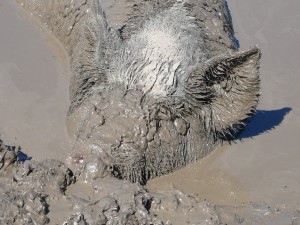
Animals that Like to Have Fun!
In 1980 I shot my TV; there is no need for television when a farm filled with animals provides so much entertainment. Pigs are the best.
With family, friends and space, the pigs are constantly finding ways to entertain themselves. Even in winter. Here’s a clip from “Farm News – November 2013”.
They like to follow their same trails through the snow and especially enjoy following the new tracks made by the tractor which packs the snow down in even rows with nice edges, much like humans walking on shovelled sidewalks. Those parallel tractor tracks can get boring after awhile so in random spots they make a new trail through the snow to cross from one tractor track to the other. The result? A new game much like “fox and hound” where they chase each other along the track then make a sharp 90 degree to the next track or try and head them off at the next crossing.

Another favourite pastime is gathering mouthfuls of straw. Expectant mothers do this in preparation for birthing. Others like to add to their bedding. Some just see how much they can fit in their mouths. Sledding? The plastic toboggans the pigs drink from will often get pulled around the pasture. They’ll even try to bring them into their houses. Yesterday I saw a pig carrying a snowball, much to the envy of the others. Another one stole an empty pail from my daughter. “Catch me if you can!” it might have said. It took about three minutes. Quite awhile considering the pig had the disadvantage of not being able to see with the pail in its mouth.
Interested in more about the pigs and the farm ?
SPCA
Of the one billion pigs raised in the world (half in China) I can’t help but wonder how many enjoy a good quality of life. Starting locally, I like to support organizations that work to improve the animals standard of living. I was so proud of the BC SPCA. They were local, based in Vancouver and on their own, developed a set of standards for the humane treatment of farm animals which was available to farms across Canada. Unfortunately their certification process only lasted for a few years and in 2020 they stopped.
The BC SPCA is sadly missed The remaining organizations who certify farms for animal welfare standards are all based in the United States.



